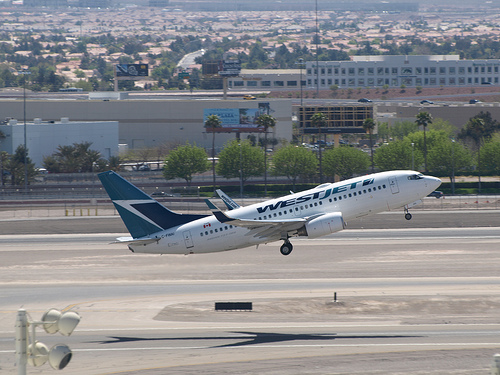
The airline industry is one littered with the shells of former companies that were unwilling or unable to adapt to the volatile aviation landscape. In the past century, 78 airlines have failed in Canada alone, in comparison with the 356 that have gone out of business in the United States. So how, with the industry seemingly crumbling around us, has Canadian company WestJet managed to post positive gains for 23 consecutive quarters? Given its emergence from humble beginnings as a Canadian aviation powerhouse, WestJet’s success is obvious, and on March 23 WestJet CEO Gregg Saretsky spoke to a packed house at Matsqui Centennial Auditorium to share the secrets to WestJet’s success.
The presentation began with Abbotsford Mayor George Peary’s introduction of Saretsky and a discussion of the hard work and dedication that the city of Abbotsford and WestJet have put in to make the partnership a resounding success. Perry credited WestJet with putting the Abbotsford International Airport (YXX) on the map, adding that the relationship formed between the airport and airline was a result of the unique approach WestJet takes to doing business which each city it works out of.
Individuals are not employees, but people. Customers are not passengers, but guests. There is no such thing as a policy at WestJet, and the company is instead run on the basis of promises. The unique culture of care established by WestJet has assured that a company that began with three airplanes flying out of six cities grew into a corporation that has the now reachable goal of flying out of 130 cities with 94 aircraft in the coming years.
Saretsky began his presentation with a video showcasing how the corporate brass at WestJet enjoy fostering an environment of fun, while simultaneously driving home the company’s motto: “owners care.”
The ten minute long rap was complete with costume changes and the donning of various bling and accessories that left many of WestJet’s department heads clad in gear more fitting of a 50 Cent video than a boardroom. Not your typical look for a company CEO, but at WestJet it appears it is not just business as usual.
Saretsky continued the presentation by laying out WestJet’s 5 keys to success, adding that they all worked together to promote an environment of “care.”
“Fostering a culture of care is first and foremost,” he noted. WestJet has done this by establishing a sense of community through its 250 annual programs celebrating culture, and the creation of a “culture department” whose sole purpose is to listen to the desires of the WestJet employees.
WestJet further fosters an employee-first environment by sharing its profits with them. This is done through a stock purchase plan whereby those who work for WestJet are able to buy a part of the company, sharing in its success.
“This goes on to assure that employees will assist in delivering a product that they value, and not something that embarrasses the company,” said Saretsky.
“This is the third core value of WestJet’s success, and leads to the fourth value which is the idea that WestJet listens,” he added.
The company does this through doing more surveying of employees and customers than any other airline in Canada, testing new ideas, and beginning new promotions based on consumer and employee feedback.
“Through surveying and by having a member from corporate headquarters visit each base at least a couple times a year, we listen directly to employees as they work to improve the company.”
The presentation concluded with the fifth, and possibly most important value needed to sustain the current level of WestJet success.
“It ends with Fun. Fun is part of the fabric of culture at WestJet. We do this by promoting new launch destinations, incorporating family members of employees in the business, and allowing those involved within the company to freely express their needs,” Saretsky said.
WestJet was born out of the idea that in order to succeed in an industry that was marred by failure, something had to be done differently. By becoming a company that was driven by values instead of policy, and by encouraging each employee to use their best judgment when dealing with issues, the once unreachable goal of becoming one of the top airlines in the world has now become more attainable than ever.


